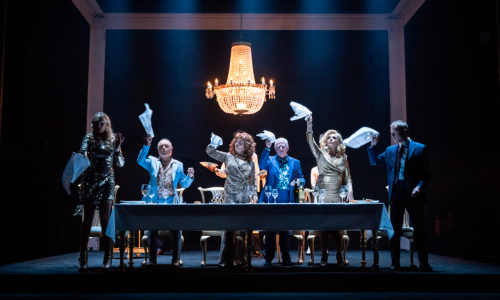Review: Pinter Five and Six

The season of Harold Pinter’s short plays at his eponymous theatre continues its blistering run of form with another full day’s worth of mind-melting absurdism and savage social satire.
Pinter Five kicks off with the playwright’s very first work, The Room, written in 1957. It’s a strange little piece, a working prototype for the menacing, fractured plays that would follow, where fear and frustration seep into life through cracks in the banal and quotidian.
Jane Horrocks plays Rose, an anxious housewife in a fading, freezing apartment. She fixes her taciturn husband a mug of “lovely weak tea”, imploring him not to leave the sanctuary of their home. The outside world terrifies her and every intrusion is a potentially catastrophic event.
It introduces some of the themes that would fascinate Pinter throughout his career – how two characters can see the world completely differently; how the ‘outside’ is a threat to our internalised worlds.
The last time The Room was performed, in Los Angeles in 2016, it was reimagined as a kind of bleak comedy. In director Patrick Marber’s version it’s more akin to a melancholy ghost story, with countless lost souls inhabiting the same sad space, multiple realities draped loosely over one another.
The second play is a screeching change of pace – the riotously funny Victoria Station (1982). A taxi dispatcher radios through to a cabbie with a job at the titular station, but the cabbie has never heard of the place, nor does he know where he currently is. The dispatcher – a wonderful performance by Colin McFarlane – becomes irate, threatening, contemplative and, eventually, rather frightened.
It’s brilliantly absurd – it’s hard to review so many Pinter plays without resorting to the “A” word – rumination on the breakdown of communication between human beings.
Marber’s final play, Family Voices, continues the theme of miscommunication. It’s an epistolary work in which none of the letters appear to be received, or perhaps even sent. It’s the tale of an estranged mother (Horrocks again, this time playing posh) and her son, whose lives never quite sync up. The son says he’s boarding with a family while studying in another city, but his mother hasn’t the faintest idea where he is, and the family he’s bunked up with are revealed to be strange and predatory. It’s the kind of play that kicks the wind out of you and then keeps kicking, with Horrocks’ performance especially heartbreaking.
Jamie Lloyd, the man behind the entire season, returns to directing duties in Pinter Six, and it may be the highlight of the run so far. With just two plays over 90 minutes it zips by in a whirlwind of insinuation and expletives. Lloyd twins two plays that centre around very different parties.
In Party Time a group of sophisticated guests gossip about a swanky new members’ club. What they are pointedly not talking about is the missing guest, who has been “disappeared”. It opens to the synth version of Henry Purcell’s Music for the Funeral of Queen Mary, best known as the theme from A Clockwork Orange. And the two works don’t just share a soundtrack – Party Time also concerns itself with the dangers of repressive, authoritarian regimes. Pinter’s characters – including John Simm as a snivelling apparatchik – are at pains to discuss anything but the chaos and misery they’re responsible for creating outside of their chic little bubble.
Celebration, one of Pinter’s final plays, is a more straightforwardly comic piece about a meal out with a pair of nouveau riche Cockney brothers and their bawdy wives. The take-down of a certain variety of swaggering new-money occasionally feels a little mean, but it’s wonderfully acted and hilarious in its ingenious dialogue and cutting brutality. It’s a fantastic way to end the evening; thank goodness there’s still one more in the series to come.

